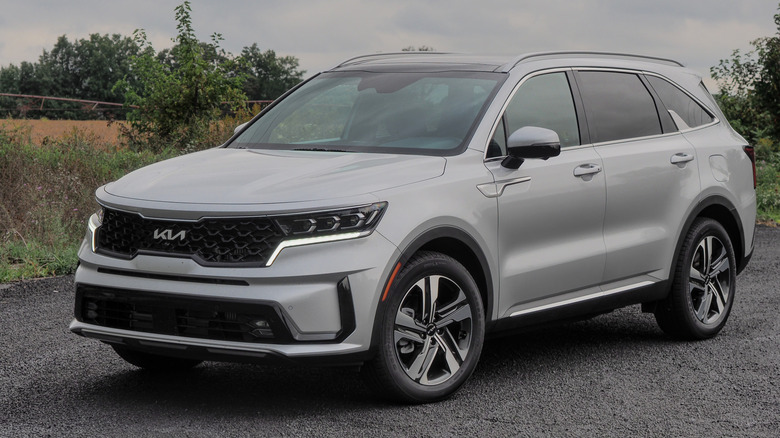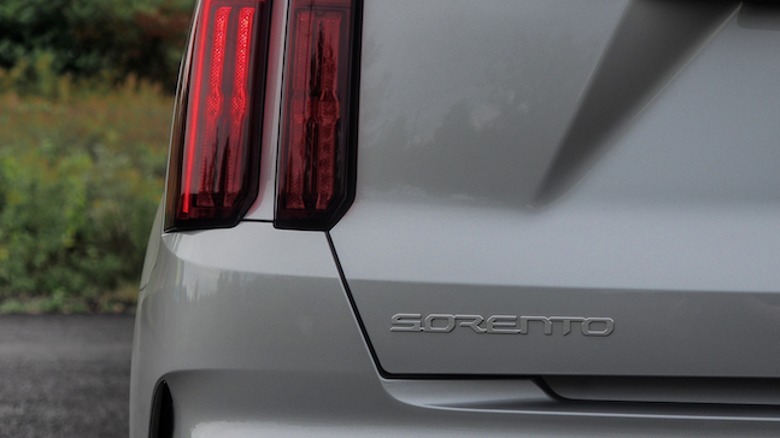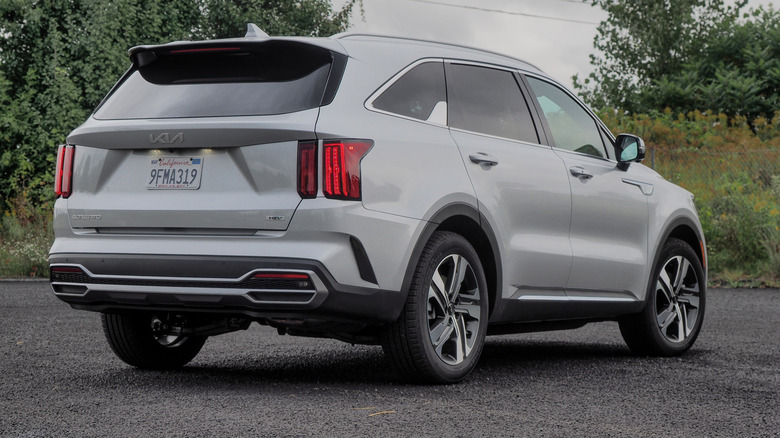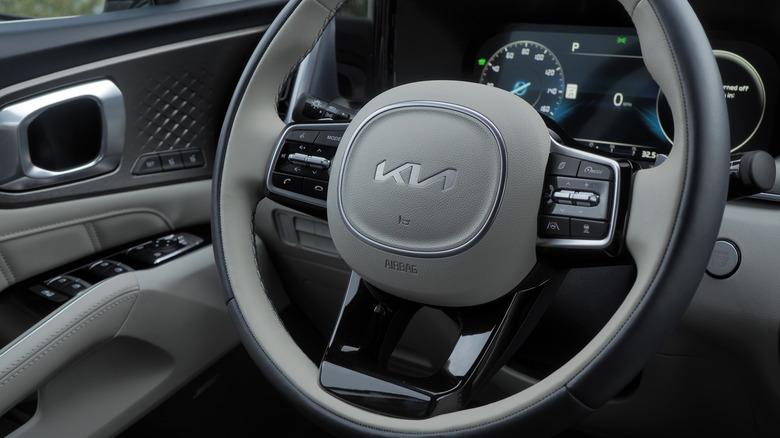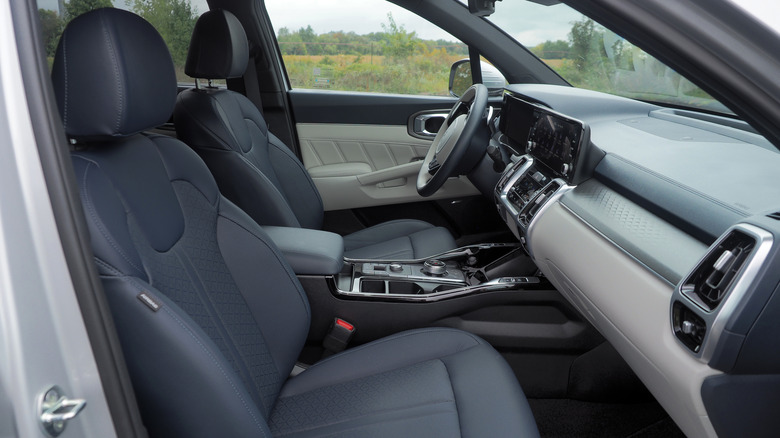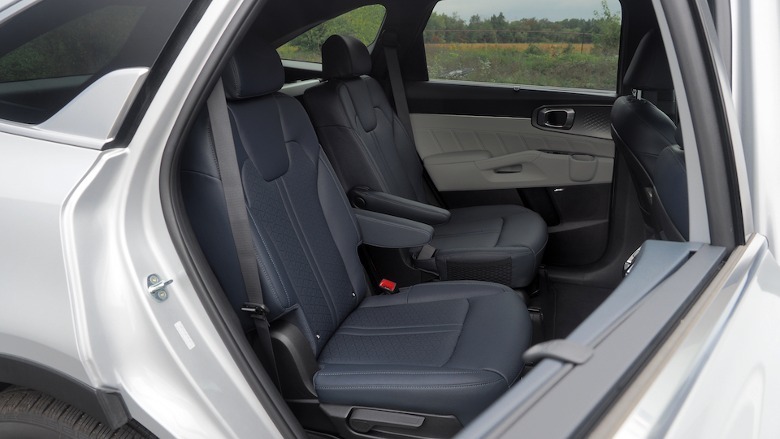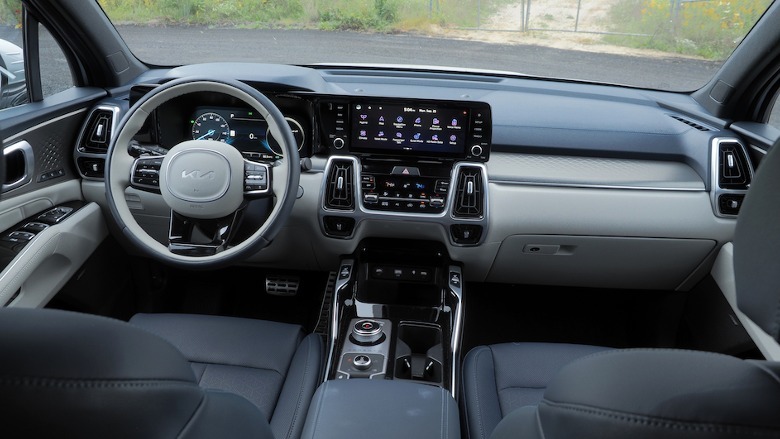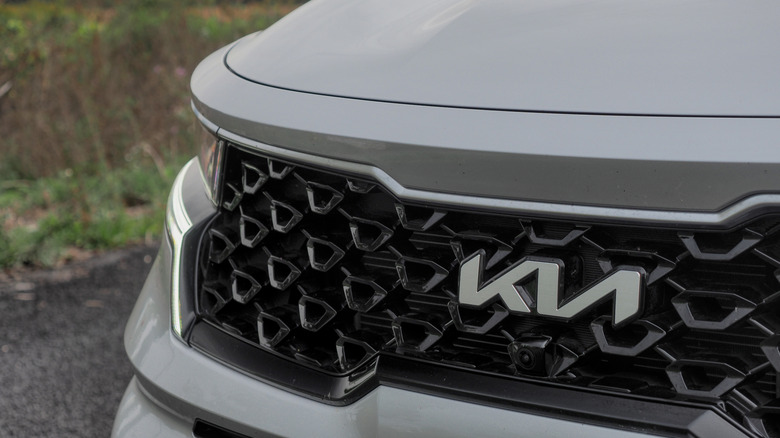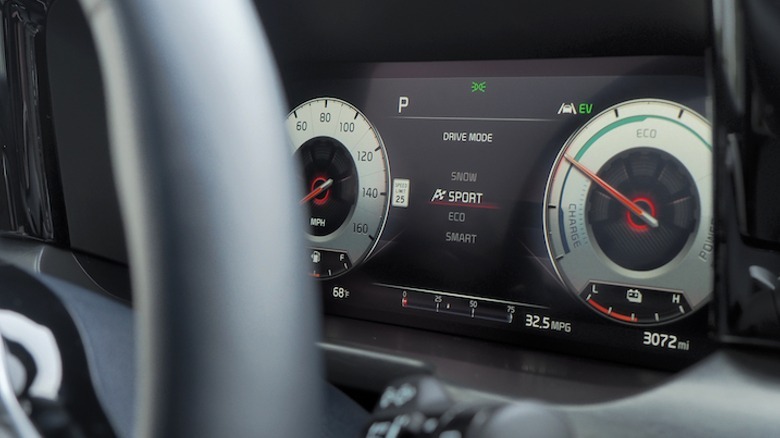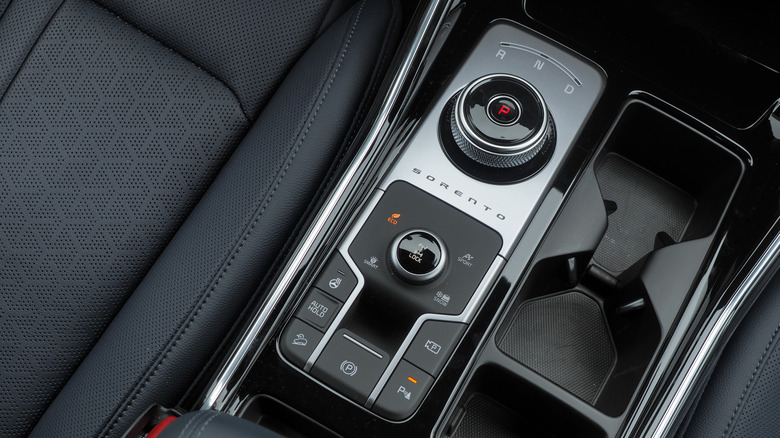2023 Kia Sorento Hybrid Review: A Capable, Complicated Answer To Going Electric
- Spacious cabin and trunk
- Smooth hybrid delivers power and economy
- Well-equipped with plenty of safety tech
- Priced competitively with gas-only Sorento Turbo
- Excellent warranty coverage
- Dashboard tech has some head-scratchers
- Third row is snug for adults
When it comes to electrification, Kia is covering its bases. Though the automaker isn't short on full EVs — the Niro EV and EV6 are available now, with the EV9 fast approaching — it also has a line-up peppered with mild hybrid and plug-in hybrid versions of gasoline models. The 2023 Kia Sorento Hybrid is perhaps the perfect example.
While a blend of gas and electric power is viewed in many quarters as a transitionary stepping-stone to the true future of zero-emissions motoring, that prognostication beyond the gas pump isn't necessarily where every new car buyer finds themselves today. For some, it's the cost of an EV that counts them out of contention; for others, concern around charging — whether at home or on the road — is the dealbreaker.
Or, simply, there may not be an entirely electric version of the car you need. Say, for instance, you require 6+ seats of transportation, an area where BEV options still look fairly spartan. What's there to do if you want to help save the planet, save some money, and still load up on every family member?
A simpler set of trims for the Sorento Hybrid
Regular Sorento ownership starts at $30,090 (plus $1,325 destination), with Kia's 2.5-liter four-cylinder gas engine. Step up to the Sorento Hybrid, however, and Kia adds electrification and takes away engine capacity. Priced from $36,690 (plus destination), there's a 1.6-liter turbocharged four-cylinder gas engine that — with the assistance of an electric motor — nudges up power while also improving fuel economy.
In fact, you get 227 horsepower and 258 lb-ft of torque, reasonable if not excessive, compared to the non-hybrid's 191 horsepower and 182 lb-ft of torque. Rather than the continuously variable transmission we're used to seeing in mild hybrids, Kia instead relies on a six-speed automatic. The non-hybrid Sorento gets two more gears in its auto.
With both engines, front-wheel drive is standard on the lower trims and all-wheel drive is an option. Kia's system has a center-locking differential, too, though it's hard to imagine Sorento owners venturing too far off-road with their SUVs. It's a $2,300 upgrade on the Sorento Hybrid EX and standard on the Sorento Hybrid SX Prestige (from $42,490 plus destination).
Solid economy without really trying
The big advantage, at least on paper, to the hybrid is economy. For a non-hybrid Sorento, you're looking at 26 mpg combined for the front-wheel drive version or 24 mpg for the all-wheel drive version. Leap into the Sorento Hybrid, however, and those numbers rise to 37 mpg combined for the front-wheel drive (39 mpg in the city, 35 mpg on the highway), or 34 mpg for the all-wheel drive (36 mpg in the city, 33 mpg on the highway).
It's a big, meaningful saving: the EPA estimates that Sorento Hybrid AWD owners save $1,500 in fuel costs over the course of five years versus the typical new vehicle. What's equally impressive is how little effort is involved in actually taking advantage of that economy. In my own mixed driving — biased to the highway and with little consideration for fuel-sipping — the Sorento Hybrid clocked in at 32.5 mpg.
Could a plug-in hybrid be even more Earth-friendly? Certainly — and Kia will gladly sell you the Sorento PHEV, from $49,990 plus destination — assuming you've somewhere to plug it in. The Sorento Hybrid isn't set up for electric-only driving, as the two halves of the drivetrain are intelligently managed by the SUV itself. Still, for something with the familiar convenience of just filling up with gas at the nearest station, there's a lot here to like.
Plenty of tech, but some odd decisions
The same goes for the Sorento's spacious cabin. There's space for six, with second-row captain's chairs as standard; the seven seat configuration in the cheaper non-electrified Sorento isn't offered, here. Base EX trim gets SynTex faux-leather trim and heated front seats, with power adjustment for both driver and front passenger. The SX Prestige trim gets leather upholstery, ventilation for the front row, and heating for the steering wheel and the second row.
Kia's dashboard tech is familiar by this point, though the Sorento's aesthetic feels a little more chaotic than in some of the automaker's other cars. There's a 10.25-inch touchscreen — that looks a little small — for the infotainment system, with standard navigation, wired Apple CarPlay and Android Auto, and SiriusXM. A wireless charger between the front seats, plus eight USB ports spread around the cabin, are also standard.
The SX Prestige trim adds a 12.3-inch digital instrument cluster, upgrades the audio to a 12-speaker Bose system, and adds a 360-degree camera to the front and rear parking sensors. It also gets a 115W AC outlet, rain-sensing wipers, and retractable rear sunshades. A panoramic sunroof is a $1,300 option.
No shortage of space or safety equipment
In the trunk, there's 12.6 cu-ft to play with when all six seats are up; you get a powered tailgate too, regardless of EX or SX Prestige trim. Drop the third row — a process which Kia makes easy — and that expands to up to 45 cu-ft, depending on how far forward you slide the captain's chairs. At most, the Sorento Hybrid will hold a capacious 75.5 cu-ft (notably no different from the non-electrified version).
Kia's standard safety package has proved impressive over the past few years, and the Sorento Hybrid is no exception. EX trim gets automatic emergency braking — with pedestrian, cyclist, and junction turning detection — together with blind spot collision avoidance assistance, rear cross-traffic collision avoidance assistance, and lane keeping & following assistance.
There's also Kia's Highway Driving Assist package, which blends adaptive cruise control and lane-keeping; it's a hands-on system, but it's one of the more refined examples. It's a little like a supporting hand on the wheel, gently assisting in turns and — despite the name — it works both on and off the highway. Step up to the SX Prestige, and you get rear parking collision avoidance assistance, too.
Refined and perky on the road
Though Kia's optional turbocharged gas-only engine for the regular Sorento is a perky thing, it also nudges the price up. In fact, you'll pay at least $35,990 (plus destination), or $700 more if you want all-wheel drive too. It's a nice drivetrain but it's undoubtedly thirsty.
Ignore the entry price and focus on a more like-for-like power and trim comparison, then, and suddenly the Sorento Hybrid feels like a much more impressive deal. Its electrification may not turn it into a full-EV rocket ship, but that hybridized shove gives it Turbo-besting pep from a standing start. It's nippy and urgent around town despite also being a family hauler.
For longer distance drives, the Sorento Hybrid is smooth and compliant. Kia's suspension is dialed on the cosseting side, easily hiding the extra 210 or so pounds of curb weight that electrification adds over the Sorento Turbo AWD. Nobody is going to accuse this SUV of being remotely sporty — and Sport mode itself just leaves the gearbox a little more reluctant to upshift, which sours the otherwise ignorable soundtrack — but then again, that's not what Kia ever set out to do.
2023 Kia Sorento Hybrid Verdict
Frugality without behavioral change is what the Kia Sorento Hybrid promises, and there the three-row SUV hits the spot. Driven with no more care than you might a regular gas vehicle, you'll probably see 10-15 mpg better from the electrified model. That's without worrying about plugging in, monitoring battery charge, or indeed doing anything more than pulling up at your nearest gas station.
Helping assuage concerns about hybrid complexity, meanwhile, is Kia's 10 years / 100,000 miles of limited powertrain warranty and 5 years / 60,000 miles of limited warranty. There's 5 years / 60,000 miles of complimentary roadside assistance, too.
Going fully electric certainly seems like the trajectory the automotive world is on. Nonetheless, not everybody has the infrastructure or the budget to do that today, a reality which — as the Sorento Hybrid demonstrates — doesn't mean there's no scope for somewhat greener motoring. More economical, better to drive, and without the culture shock of a pure EV, Kia's SUV underscores the lingering appeal of mild hybrids and why for many new car buyers they should still be the first port of call.
